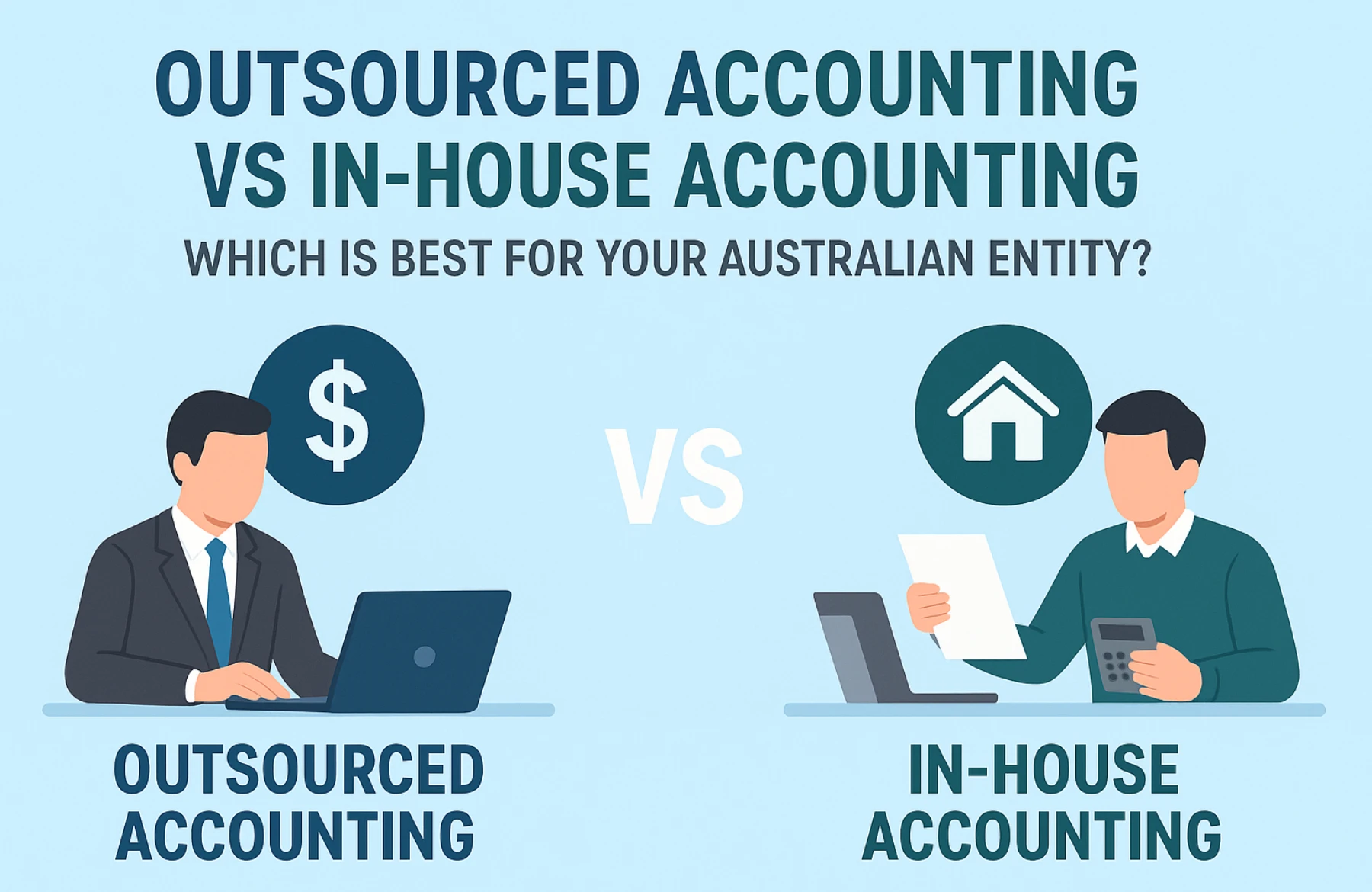Expanding your business into Australia is an exciting step—whether you’re a UK entrepreneur setting up a subsidiary, launching a branch office, or establishing a brand-new entity. But with the opportunities of a new market also comes complexity—especially when it comes to accounting.
One of the earliest and most important financial decisions you’ll face is whether to hire an in-house accounting team or to rely on outsourced accounting services in Australia.
This choice isn’t just about crunching numbers. It’s about ensuring compliance with Australian tax regulations, safeguarding financial transparency, and setting up a cost-effective structure that supports growth. The right approach can protect you from penalties, reduce overheads, and give you the clarity you need to focus on expanding your business.
So, which model is right for your Australian entity: outsourced accounting or in-house? Let’s explore both options in depth, compare their advantages and drawbacks, and then consider the best choice depending on your business stage, size, and goals.
Understanding the Australian Accounting Landscape
Before we dive into the comparison, it’s worth highlighting a few key accounting realities in Australia that every UK businessperson should know:
- Complex Tax Structure: Australia has a detailed taxation system covering corporate tax, GST (Goods and Services Tax), payroll tax, superannuation contributions, and more.
- Strict Compliance Requirements: Businesses must comply with reporting obligations under the Australian Taxation Office (ATO) and, if incorporated, the Australian Securities and Investments Commission (ASIC).
- Local Knowledge is Critical: UK and Australian tax systems differ significantly. Even experienced UK finance professionals may find the Australian framework challenging without local expertise.
- Labour Costs Are High: Australia has a relatively high minimum wage and employee costs (including superannuation, insurance, and benefits), making in-house staff expensive.
With this backdrop, the decision between outsourcing vs in-house becomes even more crucial.
What Is In-House Accounting?
In-house accounting means hiring employees (such as accountants, bookkeepers, or a finance manager) directly within your Australian entity. They become part of your team, working on everything from daily bookkeeping to financial strategy.
Pros of In-House Accounting
- Direct Control & Oversight
You have full control over your finance team. You can supervise their work, tailor processes to your business needs, and get immediate answers. - Business-Specific Knowledge
An in-house accountant develops a deep understanding of your operations, industry nuances, and internal systems. Over time, they become an integral part of strategic decision-making. - Immediate Availability
Having staff on hand means quick access to financial insights, last-minute reporting, and faster responses to operational questions. - Team Integration
In-house accountants can collaborate closely with other departments, ensuring financial strategies align with sales, operations, and HR.
Cons of In-House Accounting
- High Costs
Salaries for accountants in Australia are significant. For example, a qualified accountant can cost between AUD $70,000–$120,000 annually (plus superannuation, leave entitlements, insurance, and office space). - Limited Skillset
A single in-house accountant may not have expertise across all areas (tax, payroll, international reporting, compliance). You may need to hire multiple staff to cover everything. - Recruitment & Retention Challenges
Finding qualified accountants in Australia can be competitive, and turnover can disrupt your financial operations. - Scalability Issues
If your entity grows quickly, your in-house team may struggle to keep up, requiring additional hires and costs.
What Is Outsourced Accounting?
Outsourced accounting means partnering with a specialist accounting firm or service provider in Australia. They handle your accounting functions remotely, often supported by cloud-based systems, and can scale services according to your needs.
Pros of Outsourced Accounting
- Cost Efficiency
Instead of paying salaries, benefits, and overheads, you typically pay a fixed monthly or project-based fee. This can be significantly cheaper, especially for small to medium businesses entering Australia. - Access to a Full Team of Experts
Outsourced firms often employ accountants, tax specialists, and compliance experts. This gives you broader expertise than one or two in-house hires. - Scalability & Flexibility
You can start small and scale up services as your Australian operations grow. Outsourcing is ideal if your entity’s size and requirements change rapidly. - Regulatory Confidence
Local accountants are across ATO and ASIC compliance requirements, ensuring you meet filing deadlines, GST obligations, and payroll laws. - Latest Technology
Outsourcing firms often invest in cloud-based accounting software (like Xero, MYOB, or QuickBooks) that improves reporting, integration, and transparency. - Focus on Core Business
Outsourcing allows you to focus on growth and operations without getting bogged down in local compliance or administrative tasks.
Cons of Outsourced Accounting
- Less Direct Control
You won’t have an accountant sitting in your office. Communication may take more effort, and you need to trust your provider’s systems. - Potential Lack of Personalisation
Unless you work with a specialised firm, outsourced services can feel generic and less tailored to your business. - Data Security Concerns
Financial information is sensitive. You’ll need to ensure your provider uses secure systems and complies with Australian privacy regulations. - Time Zone Differences (If Offshore)
Some outsourced providers may be based overseas. However, if you’re working with an Australian firm, this isn’t an issue.
Cost Comparison: Outsourced vs In-House Accounting
Let’s look at an approximate cost breakdown for a UK business setting up in Australia:
In-House Accounting Costs
- Accountant Salary: AUD $80,000 per year (entry to mid-level)
- Superannuation (11%): AUD $8,800
- Payroll Tax (varies by state): Approx. AUD $4,000+
- Leave Entitlements & Insurance: AUD $5,000+
- Office Space & Equipment: AUD $5,000+
Total Annual Cost: Around AUD $100,000–$120,000+ per accountant.
Outsourced Accounting Costs
- Bookkeeping & BAS/GST Returns: AUD $500–$1,500 per month
- Payroll Processing: AUD $200–$500 per month (depending on staff size)
- Annual Tax Compliance & Reporting: AUD $3,000–$6,000 per year
- Advisory Services (optional): AUD $2,000–$5,000 annually
Total Annual Cost: Around AUD $20,000–$40,000+ depending on services and scale.
Conclusion on Cost: For small to mid-sized UK businesses entering Australia, outsourcing can be up to 70% cheaper than hiring in-house.
Which Is Best for Your Australian Entity?
The right choice depends on your business stage, size, and priorities. Let’s break it down:
Outsourced Accounting Is Best If:
- You’re a new entrant to Australia with limited staff and budget.
- You want cost-effective compliance without the burden of local hiring.
- Your business requires scalability as you test and grow in the Australian market.
- You prefer to focus on expansion rather than admin.
In-House Accounting Is Best If:
- You’re a large or established entity with complex, high-volume transactions.
- You want direct control and immediate in-office financial support.
- Your operations require tailored, industry-specific financial strategies daily.
- You plan to build a long-term Australian headquarters with a permanent team.
Real-World Example: UK Company Expanding to Australia
Imagine a UK-based tech firm opening an Australian subsidiary in Sydney. At first, the entity employs 8–10 staff, mainly in sales and operations. The company needs:
- Payroll compliance (with superannuation and PAYG tax withholding).
- Quarterly BAS/GST lodgements.
- Annual company tax return.
- Regular financial reports for UK headquarters.
Option 1: In-House Accountant
Hiring one accountant at ~AUD $100,000 annually might be overkill. That person would likely be underutilised but still costly.
Option 2: Outsourced Accounting
By outsourcing, the company pays AUD $25,000 annually for a full-service package covering payroll, BAS, tax, and reporting. They get a team of experts, cloud access to financial data, and peace of mind on compliance—at one-quarter of the cost.
As the entity grows and reaches 50+ staff with more complex financial structures, the company may then transition to a hybrid or in-house accounting model.
Hybrid Model: The Best of Both Worlds?
Some businesses choose a hybrid approach:
- Outsource compliance-heavy tasks like tax, payroll, and reporting.
- Hire an internal finance manager to handle day-to-day transactions, budgeting, and local strategy.
This can provide cost savings while still giving you in-house oversight and business-specific knowledge.
Practical Tips for UK Business Owners
If you’re weighing outsourced vs in-house accounting for your Australian entity, here are some practical steps:
- Assess Your Needs: List what you really need (payroll, BAS, advisory, reporting). Don’t overinvest in roles you won’t fully use.
- Start Lean: For most new entities, outsourced accounting is the best starting point. It’s flexible and scalable.
- Check Credentials: Only work with registered Australian tax agents and accountants (look for CPA Australia or Chartered Accountants ANZ).
- Use Cloud Accounting: Platforms like Xero are widely used in Australia and integrate easily with UK reporting.
- Plan for Growth: Reassess after 12–24 months. If your entity grows, consider a hybrid or in-house model.
- Keep UK-AU Reporting Aligned: Ensure your accounting team understands how to prepare Australian reports that feed into UK consolidated accounts.
Final Verdict: Outsourced vs In-House
For most UK businesses entering Australia, the smart choice is to start with outsourced accounting. It provides compliance, cost savings, and expertise without the commitment of local hiring.
As your entity grows, you can transition to a hybrid or fully in-house model when the volume of financial transactions and strategic requirements justify the investment.
By taking a phased approach, you protect your bottom line, stay compliant with Australian laws, and give your business the best chance to thrive in this exciting new market.




